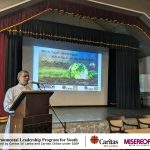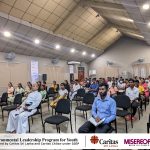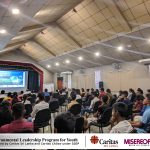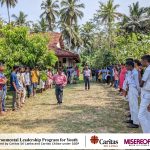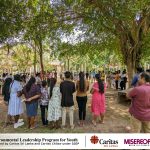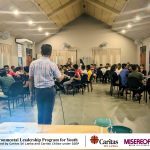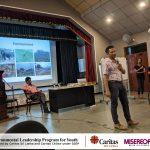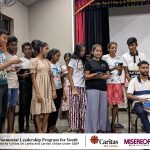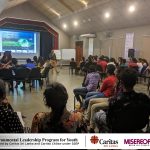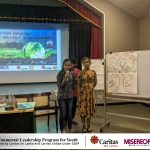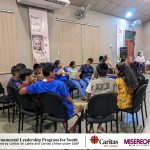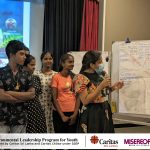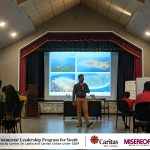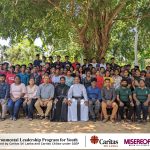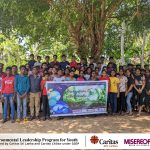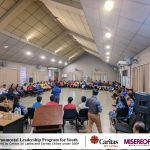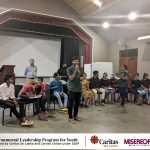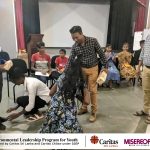Caritas Sri Lanka (CSL) organized an Environmental Management and Leadership Program for the youth in the Diocese of Chilaw under the “Stepping Stone to Safeguarding Sri Lanka’s Natural Environment project” (SSEP). SSEP is a project implemented by Caritas Sri Lanka with the goal of creating an environmentally conscious community through advocating and lobbying against all the severe environmental issues that they face in their daily life. The physical environment around us is the source of our life. Hence the project strives to capacitate the local community to adapt and mitigate the adverse consequences of climate change. A wide range of beneficiaries from adults, youths and children are a part of this project.
As a part of this journey to reach the ultimate goal of the SSEP, several capacity-building programs for youths are taking place in all the Districts in Sri Lanka with the funding support of Misereor. With that note, this leadership program was organized by CSL to capacitate the selected group of youths from Chilaw DC on leadership as well as environmental management. It was a two-day workshop held on the 29th and 30th of March at Caritas Chilaw – SEDEC. Mr. Sajeewa Chamikara from MONLAR (Movement for Land and Agricultural Reform) and Mr. Karunadasa Munagama, founder of ‘Mihithala Mithuro’ Environment Development Foundation took part in this workshop as resource persons.
Day 1 of the program focused mainly on building foundational knowledge and skills related to leadership and ecological systems. Day one was started with a common prayer by the Diocesan Director of Chilaw, Rev Fr. Dilan Marius Fernando. Mr. Sajith Silva Head of the Unit- ECPP (Ecological Conservation and Plantation People) at Caritas Sri Lanka -SEDEC continued the program with an orientation to the SSEP program. He illustrated the major project objectives and responsibilities of youth in the care of our common home. Later, the resource team was introduced to the participants.
The participants were divided into 5 groups as the first step to initiating the entire program. Each group was asked to assign a leader and a writer. Mr. Munagama carried out a series of group activities based on leadership skills, team building, team spirit, and the importance of teamwork to the youth. Participants enthusiastically participated in all the group activities. Later Mr. Chamikara conducted a lecture and an interactive session on the Ecological System Theory. During the session, he emphasized that we human beings are also a part of the environment but we are not allowed to control it. Through his explanation, he opened the eyes of participants to look at the environment from a different perspective. The youth were really engaged and asked multiple questions and shared their thoughts with Mr. Chamikara. In the evening, participants engaged in a variety of practical activities aimed at reinforcing their learning.
It is believed that a happy team builds happy products, so before ending the day one session the participants were asked to participate in the entertaining program which was inclusive of their own performances. Most of the participants presented their talents in front of the others and they mentioned that what they learnt about leadership in the morning prompted them to come forward in front of a crowd without hesitation.
Day 2 of the program was focused on developing awareness about the diversity of plants & animals in Sri Lanka’s natural environment and exploring ways to create positive change in youths by actively safeguarding their natural environment. The morning was begun with an inspiring talk by Rev. Fr. Dilan Marius Fernando. He shared his thoughts on environmental conservation and the role of the youth in safeguarding the resources for future generations. He also provided tips on how to advocate against environmental injustice.
Later, Mr. Chamikara asked all the youth participants for a recap of the previous day’s key learnings. Participants developed their own action plans for presenting the learnings of day 01. All the groups showed their creativity with their presentations. Some presented learnings through flow charts while others through drama and dialogue. One special arrangement of the presentations was that one particular group did not use paper and pens for their presentation. They explained in their presentation that those materials might be thrown away as trash, and they did not want to promote the behavior of this type, especially during a program like this. Mr. Chamikara and Mr. Munagama appreciated the teamwork and presentations done by all the groups.
After the recap, Mr. Chamikara continued a lecture on endemic and endangered animals and explained how human activities have threatened the survival of those animals in particular. He further mentioned to all the youth to take the lead on environmental issues in their areas and always act as responsible citizens to conserve our common home.
The workshop gave a chance to create a network among the participants. The organizing team believed that it would lead to the formation of new relationships and collaborations while opening ways for further impactful actions toward environmental sustainability.
Overall, the Environmental Management and Leadership Program for Youth was a tremendous success. The youth shared their feedback about the program and intentions as to how they would use the gained knowledge for environmentally friendly interventions in their communities.
Through the feedback, participants mentioned that they never had an opportunity and chance before to learn about the life, leadership and environmental protection in this manner. They promised that they would share this knowledge with the villagers and will work together to find sustainable solutions for the environmental issues they all face.
They also expressed their gratitude towards resource persons, organizers and funding partners for imparting new knowledge on environmental protection.


